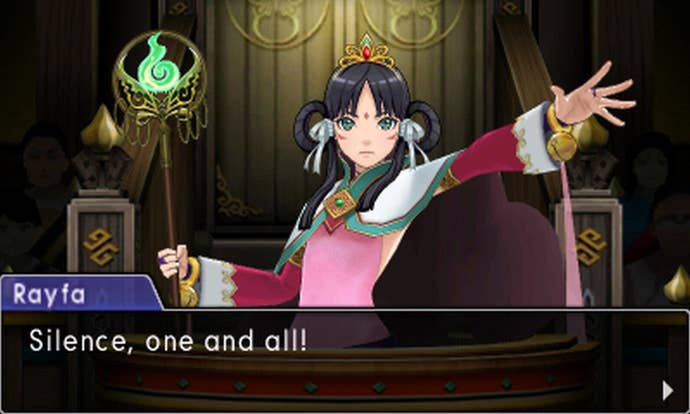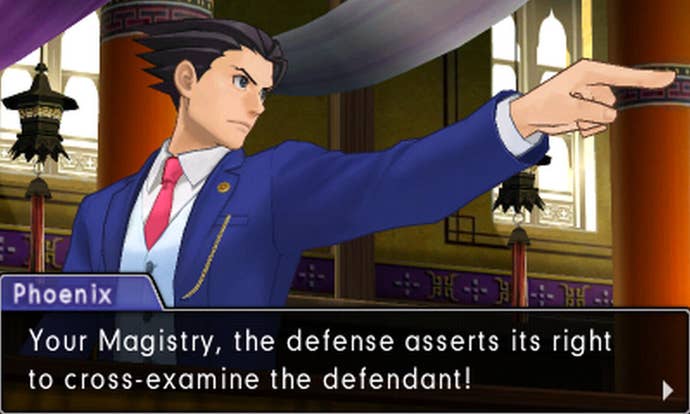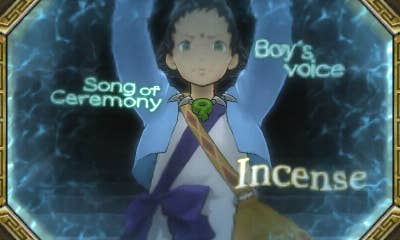Phoenix Wright: Ace Attorney ? Spirit of Justice 3DS Review: Big Trouble in Fake China
After nearly a decade of trying to find itself, Ace Attorney makes a great return to form with this newest sequel.
This article first appeared on USgamer, a partner publication of VG247. Some content, such as this article, has been migrated to VG247 for posterity after USgamer's closure - but it has not been edited or further vetted by the VG247 team.
Ace Attorney has certainly traveled a long, strange road during its 15 years of existence.
Series creator Shu Takumi originally intended to wrap up the series as early as 2004 with its third game (released here for the DS in 2007), which did an excellent job of closing the book on Phoenix Wright and friends. But in the video game industry, nothing with a notable degree of popularity can ever truly die, so after a few games spent sitting on the sidelines, Phoenix found himself headlining once again in 2012's Professor Layton vs. Phoenix Wright and 2013's Dual Destinies—the latter of which mostly serves as an informal "back to basics" reboot for the series. Even though Capcom has done an admirable job of keeping the Ace Attorney fires burning, the games to follow the original trilogy have mostly struggled to form their own identity, or prove their worth as more than just works engineered to capitalize on something else's popularity.
After close to a decade of trying to figure itself out, Ace Attorney's latest (and sixth) installment, Spirit of Justice, represents a true return to form for the series. While it's couched in the reliable mechanics and rhythms fans of Phoenix Wright know and love, these elements are delivered with a degree of confidence that's been missing since the original trilogy's finale. Those hoping Ace Attorney would evolve beyond the fairly simple interactions of its predecessors—as Takumi's great Ghost Trick did—may feel a little let down by Spirit of Justice, but if you're looking for a collection of complex, satisfying murder mysteries told via the series' trademark anime melodrama and unbelievably believable plot twists, it doesn't get much better than this.
Change of Venue
To keep things fresh, Spirit of Justice drops Phoenix into the land of Khura'in, a vaguely Chinese country where lawyers are hated, and all murder cases are decided by the means of an ancient ritual that displays the victim's final moments from their perspective. While this new setting mostly justifies SoJ's slightly fan service-y angle by reuiniting Phoenix with his former assistant, Maya, it also gives him a formidable challenge after winning a dozen harrowing, high-stakes cases in his home country of Kinda-Sorta-America. In Khura'in, Wright is essentially knocked down to the lowest rung of the social ladder, and, thanks to a government act that states attorneys must suffer the same sentence as their clients, every case is literally a life-or-death situation.

If you've played a Phoenix Wright game before, Spirit of Justice's beats should seem very familiar. You have your pompous, stone-cold-serious prosecutor with a heart of gold, a cast of colorful, ridiculous, prop-wielding characters, and a series of seemingly unrelated cases that add up to a surprisingly interconnected story by the finale. Again, there's a bit of a focus on fan service this time around, but Spirit of Justice works hard to justify its choices. Rather than putting fan-favorite Maya front and center (as Layton vs. Wright did), Spirit of Justice waits until the third chapter to introduce her, then immediately swaps her out for a cranky, belligerent replacement. Even Ema Skye, another returning character, is used pretty sparingly; even if Ace Attorney can't completely divorce itself from its past, the developers have found a pretty tasteful way to make these callbacks work.
One of the more surprising elements of Spirit of Justice can be found in its overarching theme, which is incredibly consistent but not vague and/or overbearing—like "THE DARK AGE OF THE LAW" that popped up so frequently in Dual Destinies. Essentially, SoJ pits faith against reason, as each of these concepts stand as a means of explaining reality. The people of Khura'in take things at face value, while Phoenix and his crew believe the final moments of the victim amount to just another piece of evidence to be analyzed. While it would be easy for a series built on logic and reason to come down hard against faith, Spirit of Justice goes for a much more nuanced and surprisingly smart approach. Plus, this is a series where ghosts regularly testify in court, so Phoenix can never be too dismissive of theological leanings.

Law and Disorder
Unsurprisingly, Spirit of Justice plays out nearly identical to its predecessors. Over the course of the game, the length cases expands nearly exponentially, and while your first legal adventure doesn't leave the courtroom, afterwards, you'll be asked to do some investigating yourself—the members of the Wright Anything Agency are detectives as much as they are lawyers. Since the SoJ experience adds up to 25-30 hours of reading—with some choices to make here and there—the developers do a great job of mixing up your activities so you're never stuck in one mode for too long.
The real meat of Ace Attorney has always been pointing out contradictions, and Spirit of Justice finds a number of ways to dress up this basic act to keep it interesting. Of course, you have your standard Ace Attorney gameplay, which involves countering faulty testimony with contrary evidence, but SoJ also incorporates every other character-specific version of this concept from past games. The biggest addition, "divination seances," amount to some of the biggest challenges you'll face, as these pieces of evidence task Phoenix with finding inconsistencies between a summary of the vision, and the vision itself. And you're not just limited to what a victim sees in their final moments: other senses like smell, touch, and hearing play into these visions as well. Essentially, divination seances are a much more complex version of the "mood matrix" puzzles from Dual Destinies, and I always enjoyed when these pieces of spiritual surveillance footage challenges surfaced in court.

The recurring, slight flaws of the Ace Attorney series haven't disappeared, though. As with past games in the series, there are times when you know what you want to say, but aren't sure exactly how to say it with the limited means of interactivity available. Spirit of Justice also includes some irritating edge cases where two pieces of evidence could possibly work as a solution, but only one is "correct." One particularly egregious example asked me to identify a particular person, yet would only accept one of the two pieces of evidence I had that clearly contained a picture of him. These situations make for some slight speed bumps during the Ace Attorney experience, though they do make me wish the developers were a tiny bit more thoughtful about the pass/fail system they've established. And I also wonder why the series still retains its "health meter" when you no longer need to save-scum your way to success: Failing and restarting a trial simply kicks you back to the question that sunk you, and with full health to boot.
Spirit of Justice may fall back on some familiar Ace Attorney beats, but no entry in the series has ever looked this good. Dual Destinies and Layton vs. Wright were fine-looking games, but SoJ doubles-down on character animation in a very impressive way. Every character you meet is guaranteed to have at least a few minutes of expressive and entertaining bits of animation—often with an innocuous prop that gradually reveals their true colors—which does much to add flair to a mostly passive experience. Plus, it's always satisfying when the downfall of the guilty party involves a lavishly animated "finishing move" that has them freaking out, breaking down and keeling over in an always-hilarious way.
The Verdict
Even though I found the last few Ace Attorneys a touch misguided and disappointing, Spirit of Justice has done much to restore my shrinking faith in the series. While the machinery for the series has essentially been in place for 15 years, Spirit of Justice stands as the first AA game since 2007's Trials and Tribulations that didn't feel like it was aimlessly treading water for the sake of extending a series past its supposed expiration date. While Dual Destinies took the form of a somewhat rocky reboot, the developers at Capcom have finally established an identity for the series in the absence of its original creator. Even if Ace Attorney isn't due for drastic changes anytime soon, I'll keep returning to its reliable brand of complex, melodramatic mysteries so long as Capcom keeps making them.
InterfaceSpirit of Justice's straightforward interface doesn't complicate the game's fairly simple interactions.
Lasting AppealThis is a linear adventure game, so it's not exactly designed with replayability in mind. But it'll keep you busy for at least 25 to 30 hours, which amounts to a pretty lengthy experience.
SoundAs expected, Spirit of Justice features many remixes of past tunes, but the new ones are equally worthwhile.
VisualsFor being a game so reliant on simple text, Spirit of Justice is downright gorgeous. Characters pop with personality-laden animations, and beautiful backgrounds make good use of the platform's 3D effect.
ConclusionWhile Ace Attorney has had its ups and downs since the original trilogy came to a close, Spirit of Justice amounts to the fresh start Phoenix Wright needed to break away from his past. A great setting, fantastic mysteries, memorable characters, and a consistent, thoughtful theme make this a must-play for anyone interested in Ace Attorney's anime-infused take on Law & Order.


